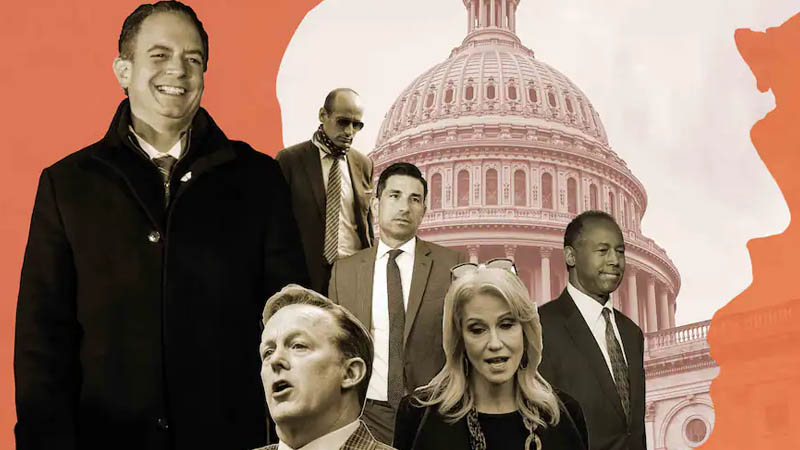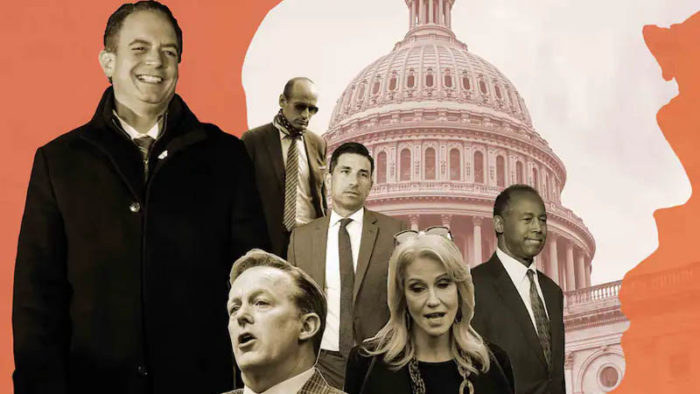Priebus is “constantly tinkering” with chemical levels, the salinity, the temperature and the water flow to make sure they are all appropriately calibrated. Former aides said Priebus would drive to coral reef conventions in Secaucus, N.J., to procure specialty fish, spend thousands sprucing up the tank and ask staffers to regularly maintain and clean his work tank.
The pseudo-reef is a delicate habitat, and if he’s being honest, his time as the chairman of the Republican National Committee and his subsequent stint as President Donald Trump’s chief of staff didn’t always leave him the time he needed to maintain it.
“I had fish disappear,” he said.
He spent those years tending to another fragile ecosystem, the Republican Party.
He helped get the GOP out of debt when he took over as chairman in 2011, tried to expand the tent to more Hispanic and Black voters after an electoral drubbing in 2012 and, although reluctant at first, became a vociferous Trump defender during the 2016 campaign before serving as his envoy to Establishment Washington when he took office.
A consummate people-pleaser who became a popular party chair, Priebus soon found himself displeasing everyone: the Never Trumpers for standing by his man despite odious behavior; the MAGA crowd for never fully being one of them; and eventually the president, who ended his tenure with a tweet as Priebus sat in a waiting SUV on an airplane tarmac in a rain-soaked suit.
Now, it’s Trump who has disappeared — from Twitter, and from Washington. Priebus remains, with a tank full of fellow survivors.
“I’m happy to report that since I’ve left most of my official political activities there has been no death within the aquarium,” he says. “There has just been life and growth.”
He just celebrated his 49th birthday, enjoying a nice Mediterranean meal with his wife at Cava Mezze, after a day of Zoom appearances through the Speakers Bureau — speaking gigs that have, at times, earned him six figures. He talks about what he knows best: how Trump comes to his decisions, what could happen with legislation and the future of the Republican Party, which still sees Trump as its North Star.
He has an office by the Wharf, a recently redeveloped waterfront part of town that resembles a luxurious outdoor mall on the Potomac. For Priebus, the water is just fine.
What about the rest of the specimens? After four tempestuous years, thousands of former administration staffers find themselves in a familiar situation as old as Washington itself: trying to leverage their federal experience into further employment.
It has been tricky to calibrate. In normal times, people like former administration officials could move effortlessly from the White House to the golden arches of McDonald’s, or be delivered directly to a prime job as the head of communications for Amazon. Lower-tier staffers could tell potential employers that their time in government afforded them a deep understanding of legislative “process” and could be handed six-figure lobbying jobs.
But after four years of watching the Trump administration appease white supremacists, demonize and tear-gas Black Lives Matter protesters, ban travelers from certain Muslim-majority countries, separate children from their families at the Mexico border and inspire an insurrection at the Capitol, a lot of companies have developed something of a moral core (or, more likely, a fear of backlash).
And so the nameless staffers looking for jobs in Washington are de-emphasizing their time with Trump on their résumés if they want to work in corporate America, starting their own groups or playing up their Trumpiness for a job on the Hill, where the ex-president is practically a religious idol in the Republican caucus.
The bigger names have found off-brand versions of big gigs: Sean Spicer, Trump’s first press secretary, hosts a prime-time TV show on a station, Newsmax, that no one can find on their cable box. Trump counselor Kellyanne Conway has begun penning a tell-all of her time in the White House that has rattled some of her former colleagues and reportedly earned her a multimillion-dollar advance.
Mike Pompeo, the former secretary of state, has joined a think tank. Former secretary of housing and urban development Ben Carson started a think-tank-like organization of his own, which he’s calling (smirks, tents fingers) a “do tank.”
And Priebus? Well, we know about his tank.
Trump’s presidency was disruptive, but two things remain true about Washington: First, the people who run this place will often spend their time complaining about how awful it is here. And second, given every opportunity to leave, they’ll find a way to stay. Priebus is just one of many ambitious former Trump staffers with designs on increasing their influence — or at the very least, their wealth.
They’re betting a third Washington truism will also hold: There’s always enough chum in the water for a hungry fish to get a meal.
Matt Schlapp remembers leaving George W. Bush’s White House, where he had been political director, and feeling as if there was so much interest in his skill set and résumé that he could “go shopping” for jobs. He got out early, shortly after Bush’s reelection. His friends who stuck around until the end of what turned into an unpopular presidency weren’t so lucky.
“It was like a jobs desert,” he said. “But even that was nothing compared to what Trump-Pence people are finding themselves in today.”
Several former Trump officials told The Washington Post that the job climate was even more difficult than they believed it would be, and Trump and former vice president Mike Pence have kept a coterie of staffers on their payrolls, some because they have not been able to find other work. Some seem to have disappeared.
Kirstjen Nielsen, the former head of homeland security who is linked to the family separations at the border, sold her house in Washington, according to a person familiar with the decision, and moved in hopes that fewer people would recognize her in public. Mark Meadows, the president’s former chief of staff, changed his longtime cellphone number.
A number of other Cabinet secretaries have struggled to find jobs, while Pompeo is beginning to take political meetings and interview aides as he eyes a potential presidential bid, people who have talked to him say. Many of Trump’s political advisers are still circling the boss, looking for lucrative political contracts out of his $80 million PAC budget.
Many of the contracts around Trump are now worth more than $10,000 a month, with at least one aide making $30,000 per month, officials said. Trump, for his part, is said to be aware of this and thinking about cutting some of the contracts.
Read Full Story: washingtonpost







